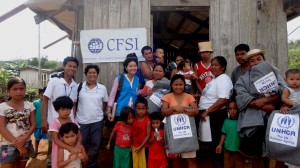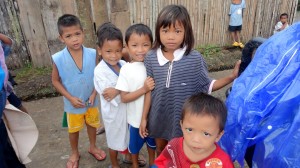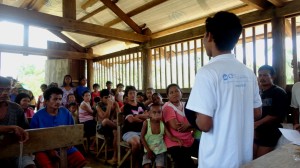 By Mary Antoniette Amistoso
By Mary Antoniette Amistoso
Visayas Protection Project, CFSI Field Office Guiuan
On the second day of February, together with my CFSI colleagues Venus and Edison, and Tukkie from UNHCR, we left Guiuan around five in the morning bound for Barangay Maybunga – a poor community situated on top of a mountain in the municipality of Balangiga in Eastern Samar that was hard hit by Typhoon Haiyan (Yolanda), which struck the Central Visayas region of the Philippines on November 8.
Two hours later we arrived at Barangay Ginmaayuhan, the last barangay accessible by either four-wheel drive or motorcycle. Upon arriving, we set about looking for people to help us carry 80 blankets in four large bundles up to Barangay Maybunga.
[pullquote]One of the main problems throughout the community was poor health … some children were sickly and malnourished[/pullquote]That task achieved, we began our uphill hike accompanied by an elderly couple, one of whom was barefoot. At first I thought it would be an easy trek; I didn’t expect it would take an arduous two hours to reach our destination. The road was not good; it was littered with large rocks that were muddy and slippery, particularly when we had to cross a small river.
 A few minutes into our journey, we crossed paths with the barangay secretary and her husband, the latter carrying their baby in “bikat”, a basket-like cradle made out of rattan. They were making their way down the mountain towards the town proper. I was amazed and at the same time felt pity for them – how were they are able to survive living in the mountains, going up and down every day? I also felt pity for the elderly couple who had come with us – how tough their lives must be. But I also admired how strong they were, considering their situation. Consolation came in the form of the overall beauty of the area. It brought us closer to nature and made us more fully appreciate what we had.
A few minutes into our journey, we crossed paths with the barangay secretary and her husband, the latter carrying their baby in “bikat”, a basket-like cradle made out of rattan. They were making their way down the mountain towards the town proper. I was amazed and at the same time felt pity for them – how were they are able to survive living in the mountains, going up and down every day? I also felt pity for the elderly couple who had come with us – how tough their lives must be. But I also admired how strong they were, considering their situation. Consolation came in the form of the overall beauty of the area. It brought us closer to nature and made us more fully appreciate what we had.
After more than two hours of walking, we finally arrived at Barangay Maybunga, where we began protection monitoring. We found that one of the main problems throughout the community was poor health, and that some children were sickly and malnourished. They said the reason for this was a lack of medical assistance. Some said that if people became seriously ill, they would often die a few days later. This was disappointing news, and is a situation we hope to change in the future.
 When our monitoring was completed, we broke for lunch before distributing the blankets we had brought with us. It was one of the best parts of our mission, seeing people smiling and joking, and telling us how grateful they were for our assistance.
When our monitoring was completed, we broke for lunch before distributing the blankets we had brought with us. It was one of the best parts of our mission, seeing people smiling and joking, and telling us how grateful they were for our assistance.
After we distributed the blankets, we decided to head back down the mountain. A pregnant woman came with us. She told us that even though life was hard after the typhoon, with the assistance being given to them and with a positive outlook on life, nothing was too hard. It made me realize that no task was too difficult when you are bringing happiness and strength to people in need.

